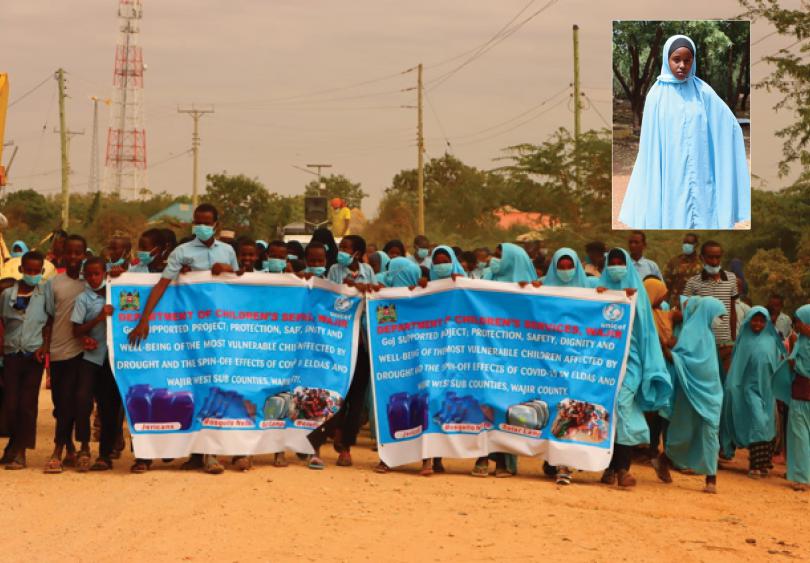Global Partnership for Education Children Summit: Big day as Kenyan children ask leaders to make education a top priority

As the world joins the African continent in celebrating the Day of the African Child today, African children are sending a clear and urgent message to governments and donors: Save our Education and make schools safe. And it is easy to see why.
In Kenya, the COVID-19 pandemic has not only denied millions of children an opportunity to return to school and learn, but also introduced serious safety and health concerns. The pandemic has exacerbated pre-existing inequalities in accessing education, especially among those groups that are vulnerable due to economic challenges, geographical insecurity and displacement.
Many girls may never return to school due to teenage pregnancies and practices like child marriage and female genital mutilation (FGM) that increased during the prolonged school closure. Additionally, boys and girls who dropped out of school to supplement family incomes during these trying times may never resume their education.
During Save the Children’s 100 Days of Action campaign, hundreds of Kenyan children used the days leading up to June 16 to speak about missing quality safe access to education due to factors like the global pandemic, unsafe schools, and discrimination against girls.
Today, our team in Nairobi hosted the Global Partnership for Education (GPE) Children summit to mark the #DayOfTheAfricanChild! The discussion facilitated by Save the Children and the Ministry of Education and chaired by the National Director for Education brought together children from across the country including the most marginalized and children with disability.
Speaking at the GPE children Summit, Caroline, a learner, expressed concern that COVID-19 has had a devastating impact on education.
"It has impacted the education sector in a big way – we could no longer go to school, no more group works, girls have become pregnant," says Caroline.


Dr. Elyas Abdi Director General, Ministry of Education applauded the children for speaking out their views, assuring them that their voices would be heard at the pledging conference in London during the GPE summit on 28th July.
“Your voices are powerful, they have been made on behalf of other children from the 90 member countries of GPE and they will taken to the highest level at the GPE summit,” said Dr. Abdi.
The GPE summit provides children with an opportunity to ask their leaders to invest in education so as to ensure that all children whose education has been disrupted by COVID-19 can safely return to school and catch up on the learning they have missed out on.


At a national event organised by the National Council of Children’s Services to mark the Day of the African Child; the President of the Children’s Government, Ruqayya Omar, presented a Memorandum from the children of Kenya to the Government of Kenya. The Kenya Country Director Ms. Yvonne Arunga spoke on behalf of all Civil Society organisations. In her speech, she reiterated the importance of developing and implementing a National Child Participation plan, that should be anchored on National Child participation guidelines, to ensure meaningful participation of children in Kenya. The Cabinet Secretary in the Ministry of Labour and Social protection led the celebrations.
While marking Day of the African Child, Catherine – the Governor of Kenya Children Assembly – Bungoma Chapter said, “Last year alone Bungoma recorded 13,000 cases of teenage pregnancy, these are girls who are supposed to be in school, some even sat for their national exams while in hospital while others dropped out of school! We therefore urge the government and other stakeholders to create awareness among the school going children and the community on how to protect children from this kind of abuse”.

At the celebrations in Wajir, North Eastern Kenya, Hibaq, 13, said:
"I am the first born in a family of five girls, and I am aware of my right to Education and to be protected from harmful cultural practices such as early marriage. I want my sisters and other girls to go to school. I would like to ask parents and the society at large to encourage education especially for girls.”

The role of education in achieving personal and societal development cannot be overemphasized. Inclusive quality education can transform lives and communities, address equity and social issues, promote innovation, reduce socioeconomic inequalities and strengthen institutions.
Even though the Kenyan government has made great progress in increasing access to education through free primary education and subsidized secondary education, there is still a long way to go in attaining full access to quality education, especially for marginalized communities.
For updates, follow us on Twitter: @SaveChildren_KE and @ESASavechildren
Story by Delfhin Mugo and Elizabeth Muiruri




